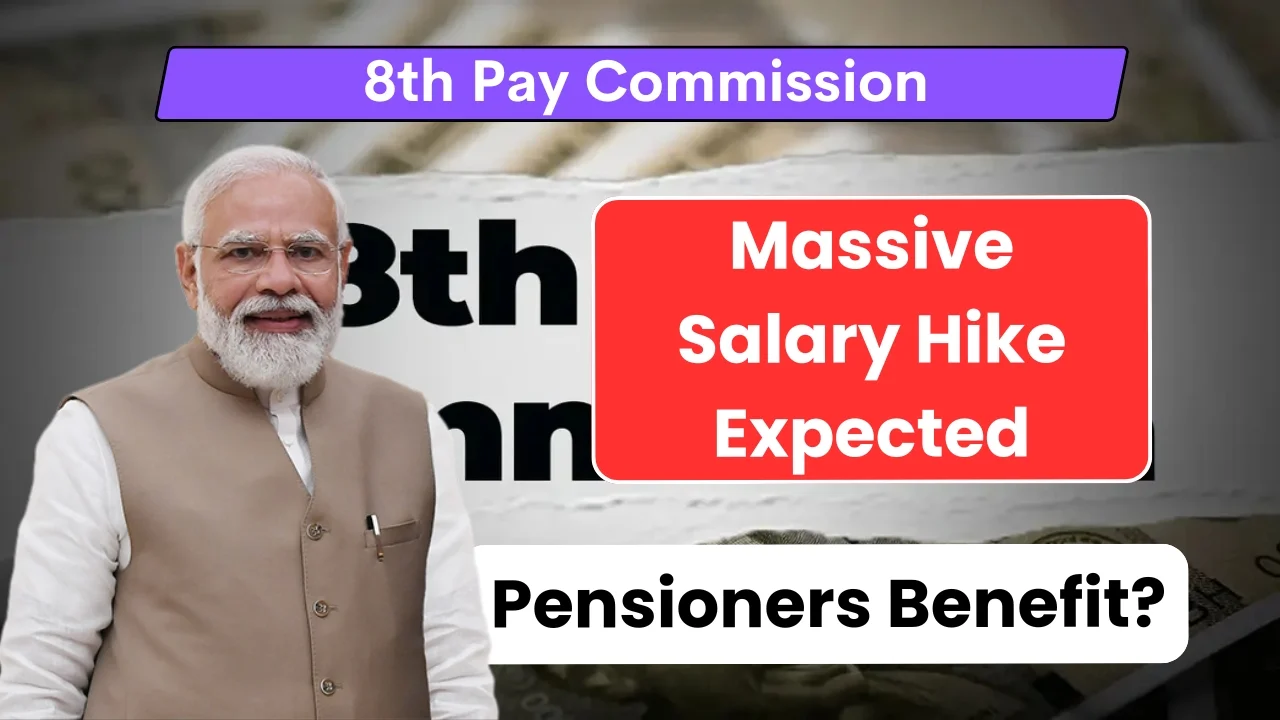The wait is almost over! After years of speculation, the 8th Pay Commission is finally on the horizon — and it could transform the financial future of over one crore government employees and pensioners across India. If you’re a central government employee, retiree, or planning to join public service, buckle up — your salary and pension might be in for a massive hike starting January 2026.
But what exactly is the 8th Pay Commission? How much salary hike can you expect? What will happen to pensions, allowances, and DA? In this article, we break down everything you need to know about this eagerly awaited revision.
What is the 8th Pay Commission?
The Pay Commission is a periodic review body set up by the central government to revise the salary structures of government employees. The 7th Pay Commission, which came into effect in 2016, significantly increased the pay and pension benefits. Now, with almost a decade passed, the 8th Pay Commission is expected to come into effect from January 1, 2026.
While there’s been no formal notification yet, strong internal sources suggest that the panel will be officially announced by mid-2025, giving it ample time to study, prepare recommendations, and ensure timely implementation.
Massive Salary Hike Expected – How Much Will You Get?
One of the biggest talking points of the 8th Pay Commission is the expected salary hike. Internal reports suggest that the fitment factor, a key multiplier used to calculate the revised salary, will be increased from 2.57 (7th Pay) to around 2.86 or more.
Estimated Salary Boosts:
- Minimum Basic Pay: From ₹18,000 to a whopping ₹51,480
- Fitment Factor: Likely to rise from 2.57 to 2.86, or possibly even 3.68 in some cases
- Overall Salary Hike: Expected to be between 30% to 35%
So, for instance, if your current basic salary is ₹20,000, under the proposed structure it could rise to over ₹27,000 or more.
This hike will not only enhance the monthly take-home pay, but will also impact allowances, PF contributions, gratuity limits, and other benefits — making it a game-changer for millions.
How Will Pensioners Benefit?
It’s not just current employees who are celebrating. Pensioners stand to gain significantly from the 8th Pay Commission too. Pension calculations are directly tied to the last drawn basic pay — and any increase in the pay matrix automatically means higher pensions.
Key Impacts on Pension:
- Minimum Pension: Expected to rise from ₹9,000 to ₹25,740
- Family Pension: Will also increase proportionally
- DA for Pensioners: Will be recalculated based on the new base structure
This means retired employees, especially those struggling with inflation, will get a much-needed relief, while family members of deceased retirees can also expect increased support.
Also Read: Big Relief for Government Workers! June 2025 Salary Hike Announced – Here’s What You Need to Know
What About Dearness Allowance (DA)?
Another major update expected along with the 8th Pay Commission is the revision of Dearness Allowance (DA). Currently, the DA is revised bi-annually based on inflation indices and is hovering around 50% of basic pay.
Once the 8th Pay Commission comes into effect, the entire DA structure may be recalibrated:
- New DA base will be fixed based on the revised basic pay
- Annual DA revisions will continue, offering inflation protection
- Some reports suggest DA may be merged into basic pay during implementation
This means government employees will have better cost-of-living adjustments, especially crucial in today’s rising inflationary environment.
What About Allowances and Benefits?
The salary hike isn’t just about the basic pay. The 8th Pay Commission will revise various allowances too, including:
- House Rent Allowance (HRA)
- Travel Allowance (TA)
- Medical Reimbursements
- Children’s Education Allowance
- Leave Travel Concession (LTC)
The final structure may offer higher percentage-based allowances based on city classification (X, Y, Z), ensuring fair support for employees in metros, towns, and rural areas.
Timeline: When Will the 8th Pay Commission Be Implemented?
Here’s what the timeline looks like based on current reports and government trends:
| Milestone | Expected Date |
|---|---|
| Official Commission Announcement | Mid-2025 |
| Submission of Final Recommendations | Late 2025 |
| Implementation Date | January 1, 2026 |
Historically, pay commissions are set up every 10 years, and with the 7th Pay Commission implemented in 2016, the 2026 target aligns with this cycle.
Also Read: Singapore Cash Payout 2025: You Could Get Up to $850 Without Applying – Here’s How It Works
Summary Table: 7th vs 8th Pay Commission (Expected)
| Feature | 7th Pay Commission | 8th Pay Commission (Proposed) |
|---|---|---|
| Fitment Factor | 2.57 | 2.86 – 3.68 |
| Minimum Basic Pay | ₹18,000 | ₹51,480 |
| Minimum Pension | ₹9,000 | ₹25,740 |
| Implementation Date | 2016 | 2026 (expected) |
| Salary Increase Range | ~14% | 30–35% (estimated) |
| Affected Employees | 50+ lakh | 1 crore+ (employees + pensioners) |
Why This Commission Matters
The 8th Pay Commission isn’t just about higher salaries. It reflects the government’s commitment to maintaining employee welfare, keeping pace with inflation, and boosting public morale.
In an era where private-sector perks often overshadow government jobs, a well-structured pay commission helps retain top talent in civil services, encourages youth to opt for government roles, and ensures retirees live with dignity.
Conclusion: Is This the Biggest Pay Upgrade Ever?
The 8th Pay Commission promises to be the most impactful salary revision in decades — especially with the threefold increase in minimum pay and pension slabs.
While we await the official announcement, expectations are sky-high. Government employees, unions, and retirees are closely watching for the green signal. If implemented with a fair and inclusive approach, this pay commission could boost spending, economic confidence, and employee satisfaction across India.
